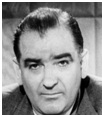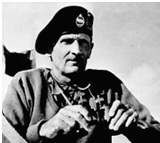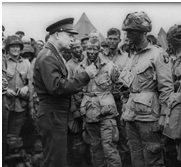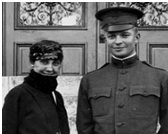|
 |
|
 |
|
|
||
Dwight D. Eisenhower Leadership
Dwight D. Eisenhower (1890-1969)
Nicknamed Ike, Eisenhower (pictured right) led D-Day and the Allied invasion of Europe in the Second World War. He was American president 1953-61
For more detail see... D-Day in the History Highlights section.
Why was he a great leader? 1. Persuasion through consensus and compromise He successfully persuaded egotists like Winston Churchill and Generals George Patton (pictured right) and Bernard Montgomery to support his plan for an Allied victory, despite considerable disagreements. He realized that military strategy had to take into account public opinion and political
desirability, balancing the interests of different countries. But he forgot this wisdom, when he let the Russian Army invade Berlin on its own, and failed to consult Churchill (pictured right), who was furious.
2. Principles Principles like freedom, fairness and patriotism, were very important to him. For example, in 1957 he sent troops to Arkansas to enforce racial desegregation which he also introduced into the armed forces. But sometimes he had to compromise his principles to gain maximum support. For example, he failed to support the Hungarian uprising against Russia in 1956. He also didn’t publicly attack the anti-Communist witch-hunt by Senator Joseph McCarthy (pictured right in 1954), although he hated him in private.
3. Courageous but calculated risk taker He courageously ordered the D-Day invasion on June 6, 1944, despite the risk of bad weather. He decided that delaying the invasion was the greater risk. 4. Tough and decisive He was extremely anxious about his decision to invade on D-Day. But he was outwardly confident with his generals, because: “I had to make them believe that everything was going to work”, he said. He firmly rejected Montgomery’s (pictured right above) idea of leading a quick attack on Berlin, sticking to his original plan (agreed with all his generals including Montgomery) of a slower attack “on a broad front”.
5. Responsibility He always:
He was prepared to take all the blame, if D-Day failed (pictured right talking to paratroopers the day before D-Day).
6. Change and planning He believed in changing to create a better future, using the good of the past but discarding the bad. He particularly wanted people to learn from the horrors of war, so he ensured the official photographing of the concentration camps, so that nobody could deny their existence. Eisenhower also realized the importance of planning, even though changing circumstances can make plans redundant. “In preparing for battle I have always found that plans are useless, but planning is indispensable”, he said.
7. Learning He learned much from his army training, and the great people he worked with, particularly his old boss, General George Marshall (pictured right in 1946). Eisenhower welcomed their new ideas but challenged them exhaustively to find out the truth. He also learned from his mistakes. He said his biggest mistake was refusing to support Britain and France in the Suez crisis of 1956, when they invaded Egypt after it had seized control of the Suez Canal.
8. Purpose and policy His single aim for D-Day was “to preserve freedom”. As president, he ended the Korean War and fought communism worldwide, involving:
He wanted to be “president of all the people”, based on his policy of “dynamic conservatism” i.e. a free enterprise, low tax economy, combined with more government spending on social security and roads. He built the Interstate Highway System with 41,000 miles of roads. 9. Hard work and ambition He was extremely ambitious and worked single-mindedly, partly to help him forget the death of his three-year-old son, Icky, in 1921 from scarlet fever (pictured right with his parents) . He described this as “the greatest disappointment and disaster of my life”.
10. Inspiring people People worked hard for him, because of trust and respect for his integrity, likeability, humility and understanding of their point of view.
11. Family support and influence He was deeply affected by his parents' devout religious beliefs (they were both Jehovah’s Witnesses) and was given great support by his wife, Mamie (pictured right together in 1916).
12. Action He learned that strategy is useless without action and knowledge. “Any damn fool can be a strategist, but it takes someone who knows armies to get the food, the ammunition and fuel there on time”, he said.
Key quotes on leadership Humility must always be the portion of any man who receives acclaim earned in the blood of his followers and the sacrifices of his friends. The supreme quality for leadership is unquestionably integrity Leadership consists of nothing but taking responsibility for everything that goes wrong, and giving your subordinates credit for everything that goes well Leadership is the art of getting someone else to do something you want done, because he wants to do it.
Key quote on ethics A people that values its privileges above its principles soon loses both.
Key quote on war War settles nothing.
Key quotes on society and success The spirit of man is more important than mere physical strength, and the spiritual fibre of a nation than its wealth. Freedom has its life in the hearts, the actions, the spirit of men and so it must be daily earned and refreshed - else like a flower cut from its life-giving roots, it will wither and die
Key quote on America I have but one yardstick by which I test every major problem...Is it good for America?
Key quote on planning In preparing for battle I have always found that plans are useless, but planning is indispensable. |
|
|
||
|
|
||
| Copyright © wisdomtowin.com 2025 All Rights Reserved | ||
|











